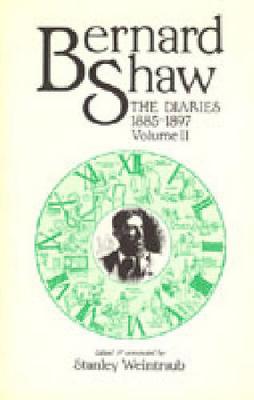Publication of the Bernard Shaw diaries is a major literary event. The 1885 1897 diaries, originally written in old-fashioned Pitman shorthand, detailed the day-to-day life of Bernard Shaw from his twenty-ninth year, when he was still a nobody, to his forty-second, when he was one of the best-known men in England.
Lost during much of Shaw's lifetime, the diaries surfaced after the war in a bombed warehouse, and were partially transcribed by his long-time secretary, Blanche Patch, in the years before Shaw's death at 94 in 1950. After that, New York scholar Stanley Rypins, self-taught in shorthand, attempted a fuller version, and the first annotations. Now Stanley Weintraub, one of the leading scholars on G.B.S. and his times, has completed, with the aid of a team of shorthand specialists, the definitive transcription of the Shavian shorthand, complete to the last ha'penny noted.
The G.B.S. diaries, as now annotated, are a lens with which to examine "radical" intellectual life in the London of the 1880s and 1890s. We not only meet Shaw striving daily to make something of himself; we also encounter the people on the fringes as well as within the vortex of radical politics in late- Victorian England. Through Shaw the journalist and critic, successively, of books, arts, music, and theater, we confront the writers and books; artists and art; composers, instrumentalists, singers, and conductors, and their music; plays, players, and playwrights of his time a cross-section of late-Victorian culture.
We also learn what it costs to buy a newspaper, get a haircut, ride the Underground, secure a cheap dinner, express a letter, go to the opera, take a lady to tea, rent ice skates, attend a music hall, tip a lavatory attendant or a crossing sweeper, indulge a beggar, replace a typewriter ribbon, visit Madame Tussaud's, use a coin machine for chocolates, black a pair of boots, mail a postcard, cross the Channel, ascertain one's weight, move a piano, give a Christmas present to one's mistress's maid, join the Fabian Society, subscribe to a magazine, reward the loser at a boxing match, lunch on bread and cheese, repair an umbrella, sit in the pit at Drury Lane, drink a shandygaff, and purchase an alarm clock. We also learn about Shaw's bedtimes (accompanied and unaccompanied), mealtimes (hasty and vegetarian, with only breakfasts at home), and his crowded life of conflicting appointments and activities, often so overlapping as to cause him to miss many of them. He needed a wife only to manage his life, and as the diary fades out he has become a compulsively active playwright and has begun to be interested in the woman soon to be Mrs. Bernard Shaw.
Other diary and notebook fragments include Shaw's earliest family memories as well as an abortive attempt to begin a mid-war diary in 1917.
All of the manuscripts utilized are available in facsimile in a microfiche companion to the two-volume edition of the Diaries."
- ISBN10 0271003863
- ISBN13 9780271003863
- Publish Date 1 October 1990
- Publish Status Out of Print
- Out of Print 8 July 2015
- Publish Country US
- Imprint Pennsylvania State University Press
- Edition Annotated edition
- Format Hardcover
- Pages 1000
- Language English
